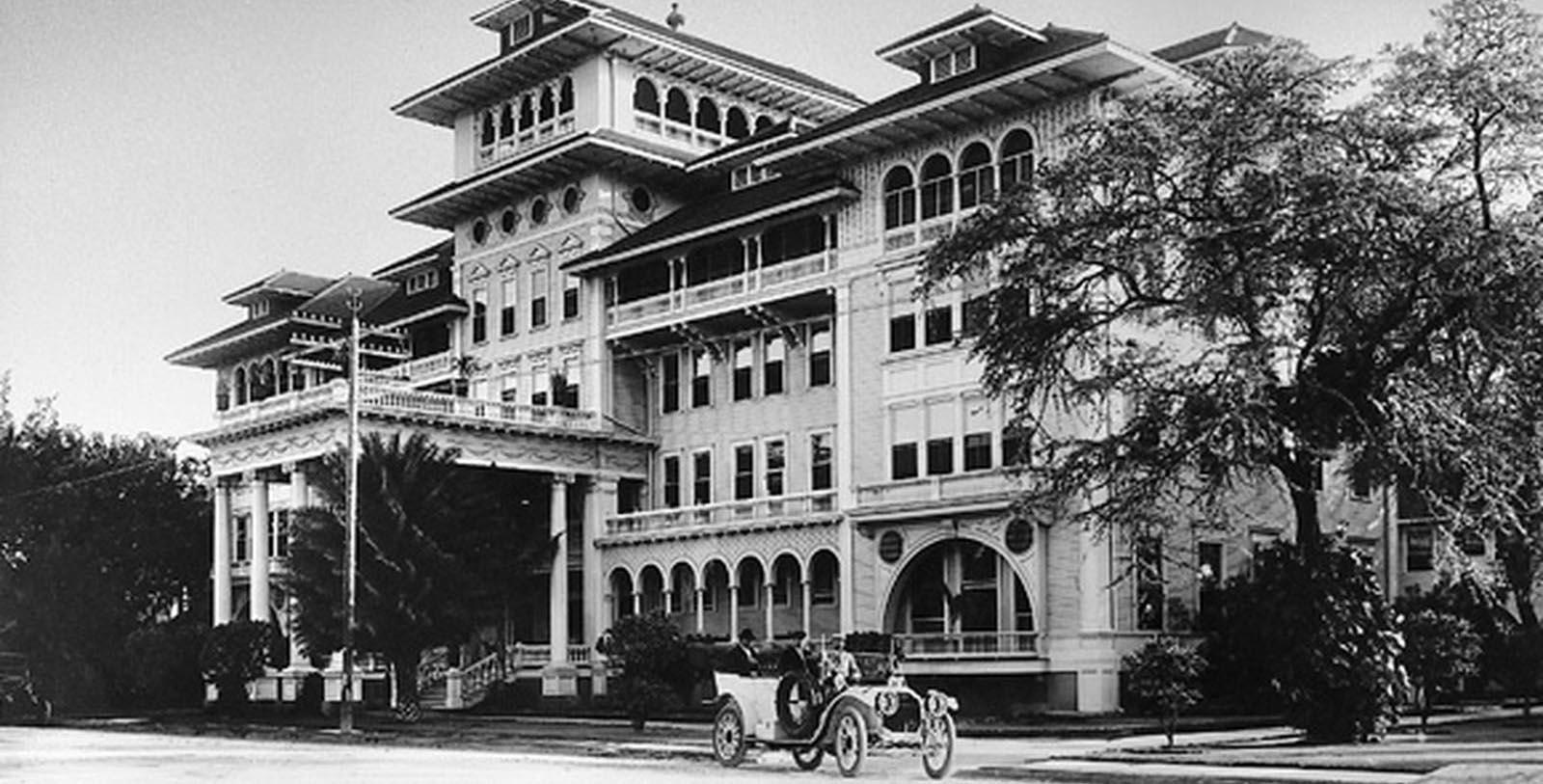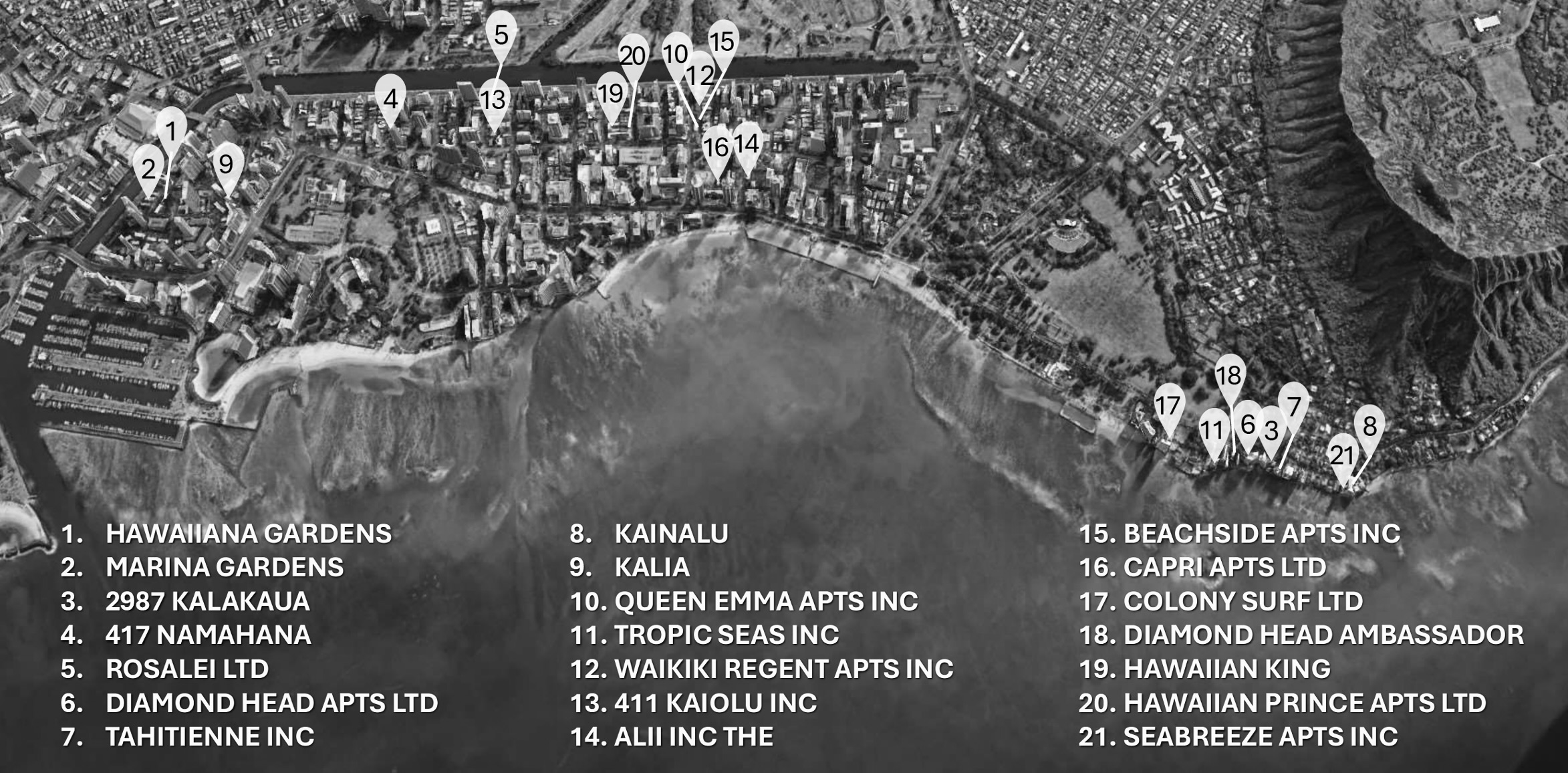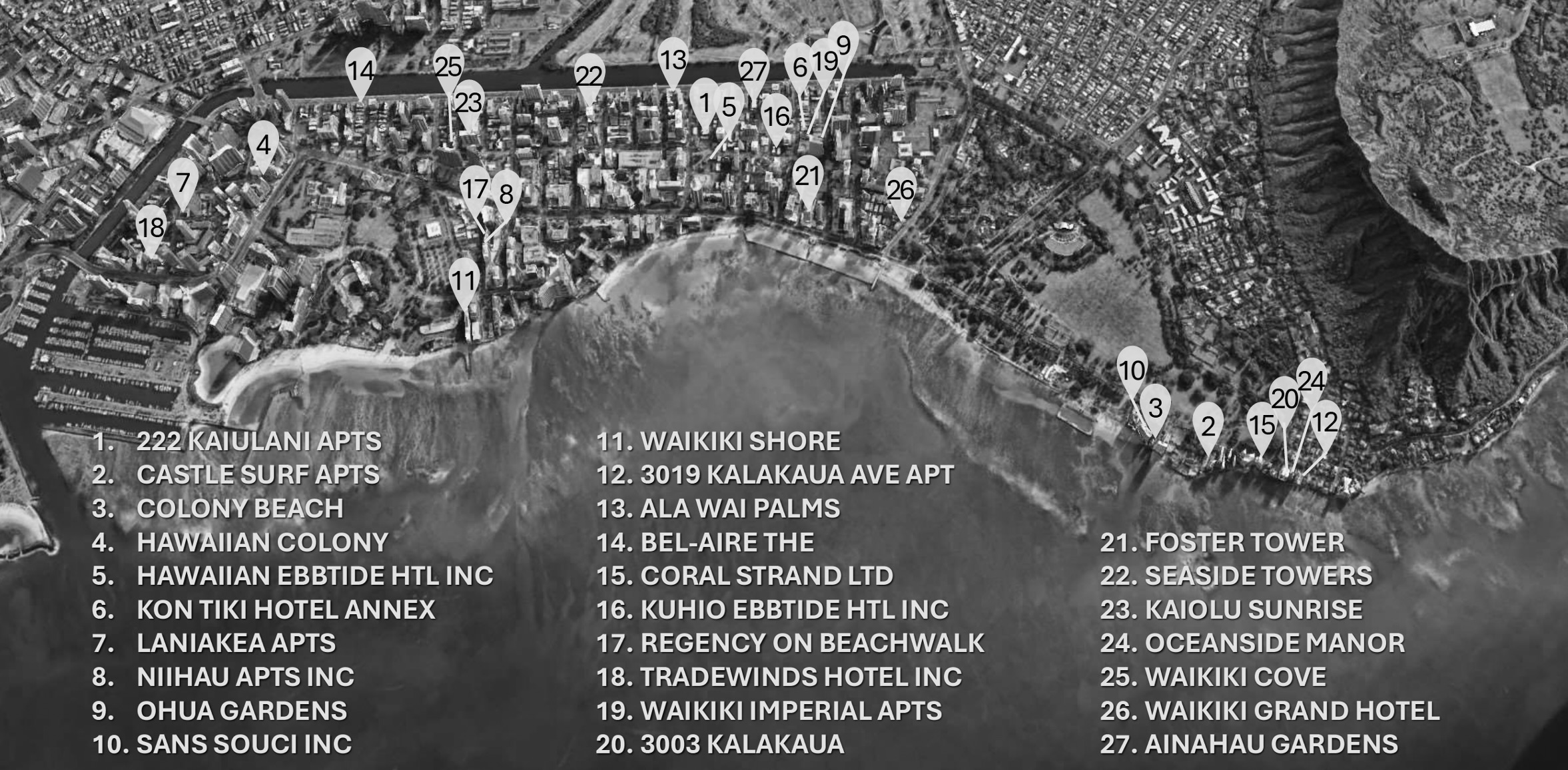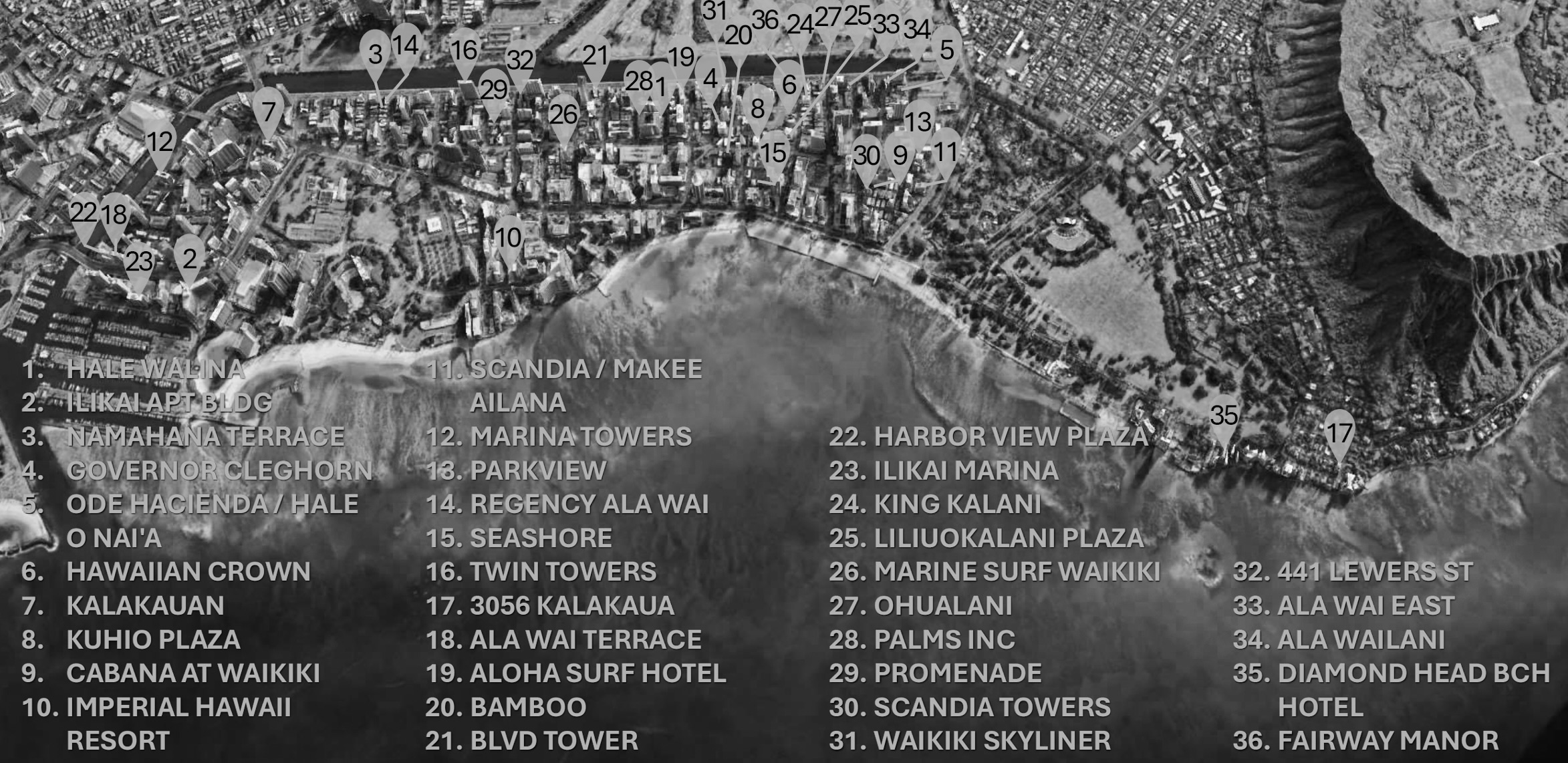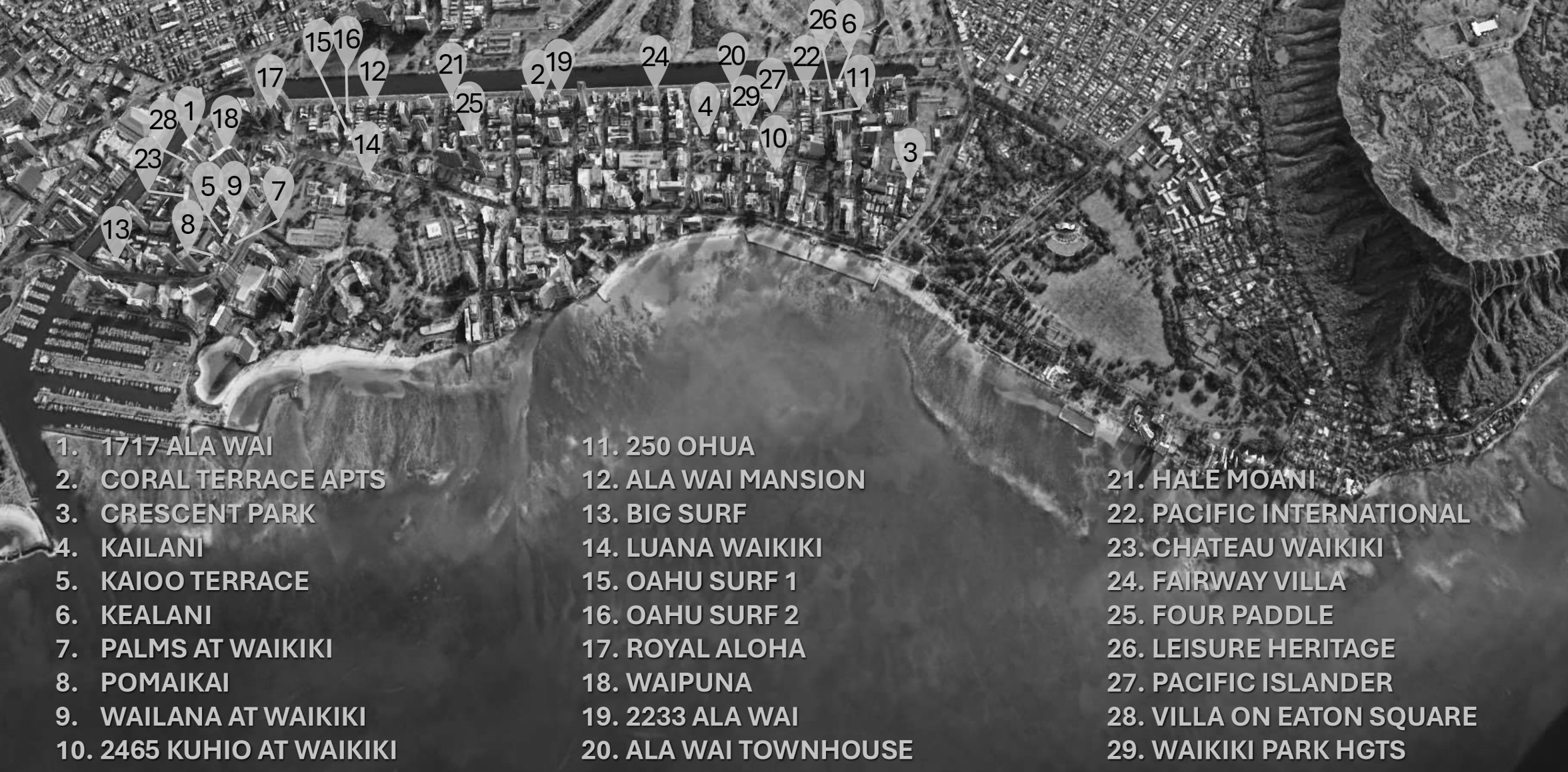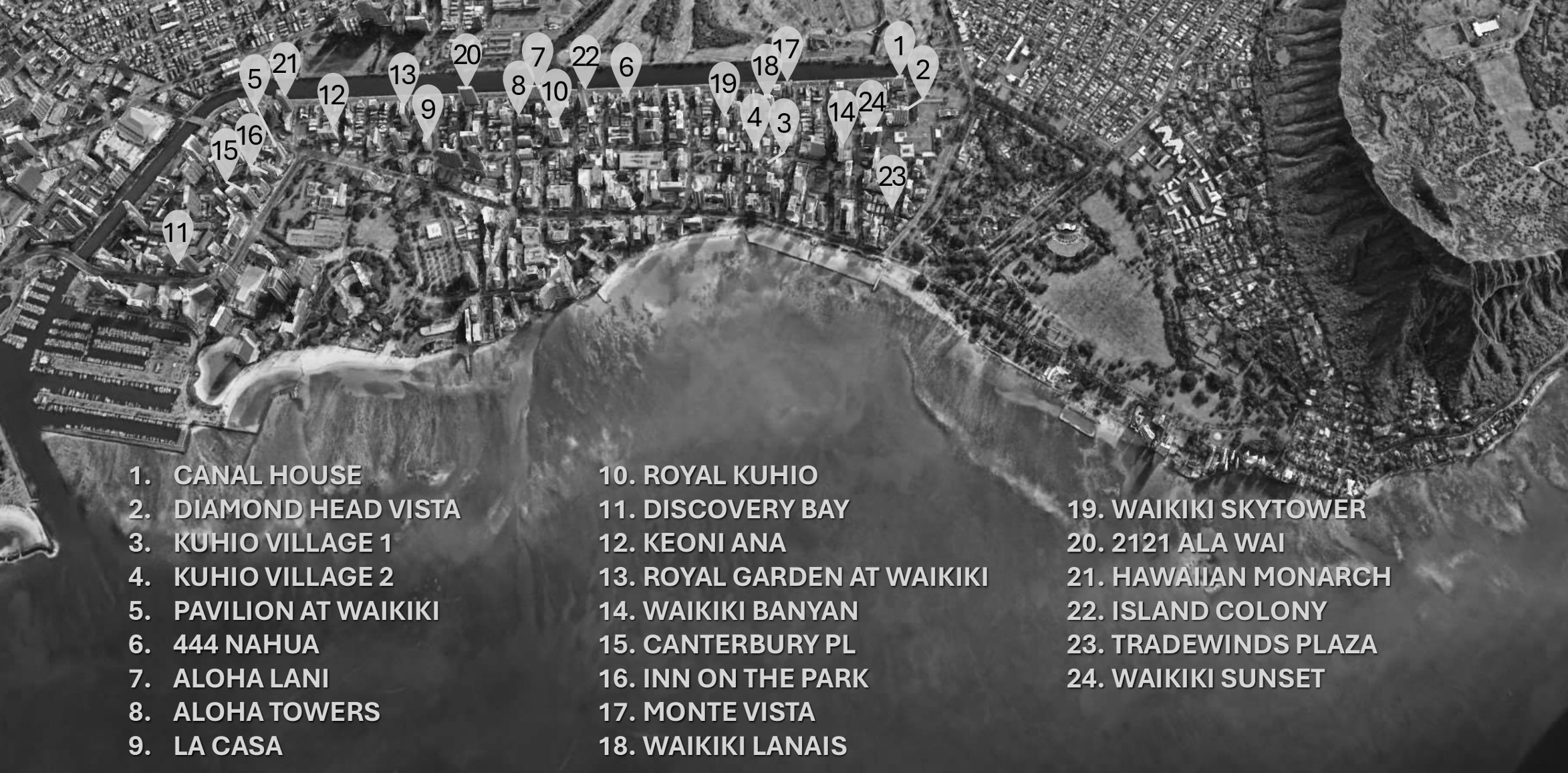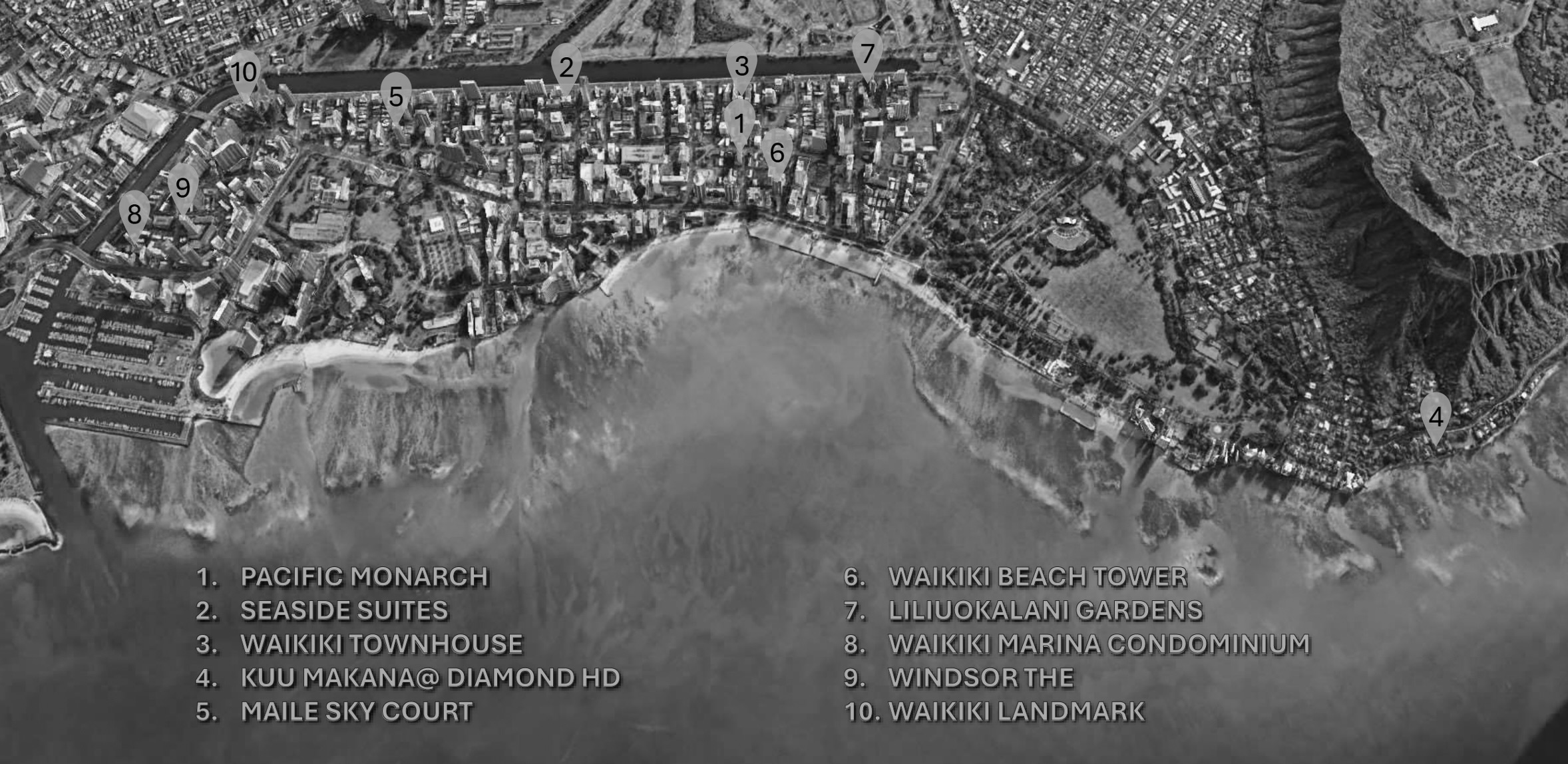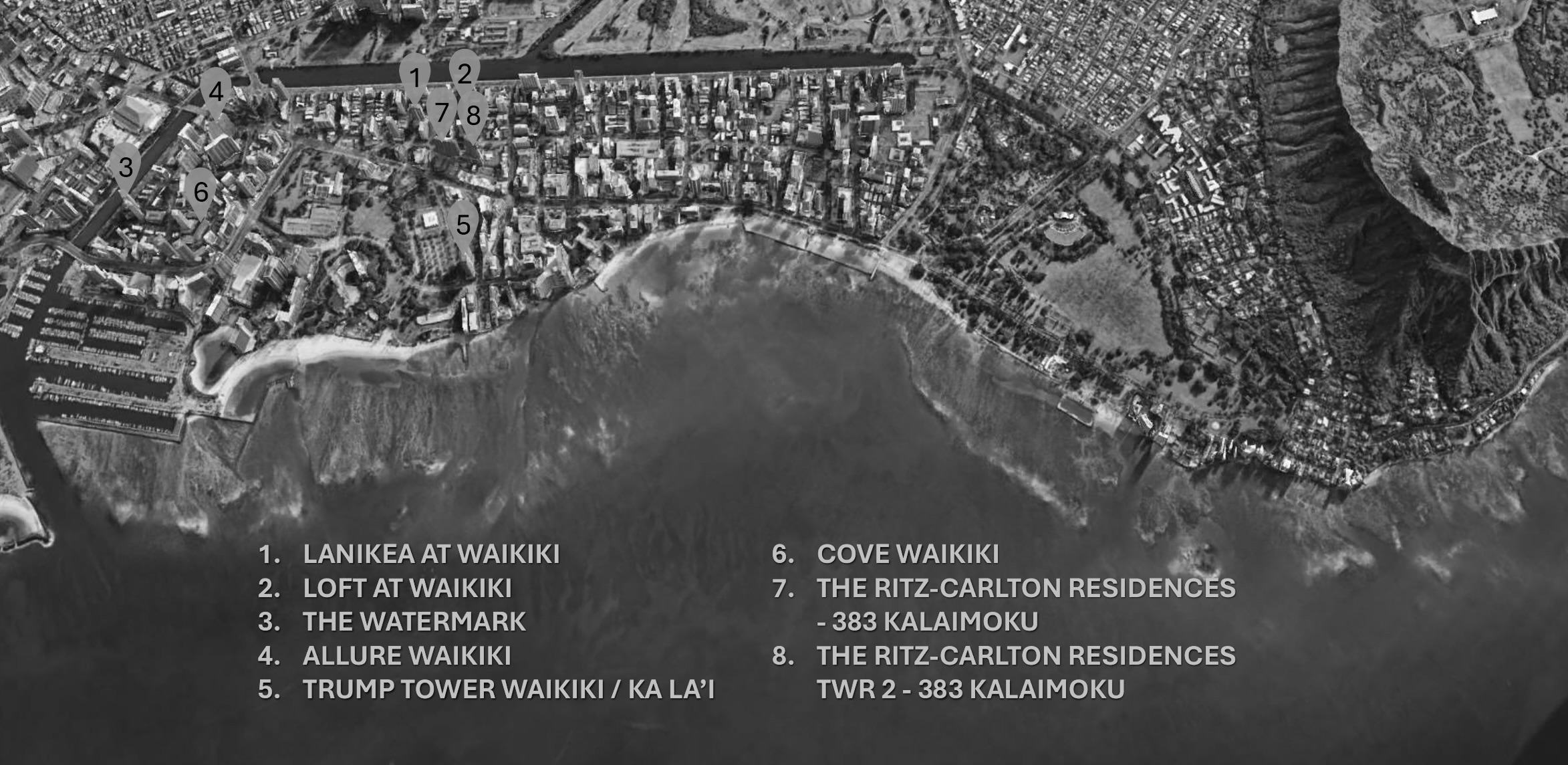Waikiki
NEIGHBORHOOD
Waikīkī, meaning “spouting waters” in Hawaiian, was named for the freshwater springs and streams that once flowed from the mountains into the area, nourishing lush wetlands and taro fields through an intricate irrigation system called auwai. In ancient times, Waikīkī was a favored retreat for Hawaiian royalty who surfed its gentle waves and found peace along its shoreline. As Western contact increased in the 19th century, the landscape gradually shifted, and by the early 20th century, Waikīkī began its transformation into a world-renowned tourist destination with the opening of landmark hotels like the Moana Surfrider in 1901. The arrival of commercial air travel and Hawaii’s statehood in 1959 fueled rapid development, turning Waikīkī into a vibrant hub of hospitality, luxury, and entertainment. Today, while its skyline is marked by high-rises and resorts, Waikīkī still carries the cultural echoes of its royal past and the natural beauty that gave it its name.
EARLY REAL ESTATE DEVELOPMENT
Originally a wetland area with rich cultural significance to Native Hawaiians, Waikīkī was known for its abundance of natural resources and served as a retreat for Hawaiian royalty. The area began to change in the late 19th and early 20th centuries, as American and European investors saw potential in its oceanfront location. The dredging of the Ala Wai Canal in the 1920s was a pivotal moment, as it drained the marshlands and made large-scale development feasible. This infrastructure project paved the way for roads, hotels, and residential buildings to take shape. The Moana Hotel, opened in 1901, was one of the first major developments, followed by the Royal Hawaiian Hotel in 1927, attracting affluent travelers and setting the tone for Waikīkī’s resort-style evolution. As tourism grew post-WWII, the demand for real estate surged, leading to a construction boom of high-rise condominiums and mixed-use properties throughout the 1950s–70s. Today, Waikīkī’s real estate landscape reflects this layered history—an urban blend of luxury residences, historic landmarks, and vibrant commercial corridors shaped by nearly a century of strategic development.
WHAT TO KNOW ABOUT WAIKIKI REAL ESTATE ZONING
Waikīkī’s real estate zoning is unique and carefully regulated to balance its role as a world-class tourist destination with residential needs. The area primarily falls under the Waikīkī Special District (WSD), which includes several zoning designations such as Resort, Apartment, Mixed-Use, and Commercial. The Resort zone allows for hotels, short-term rentals, and visitor accommodations, making it highly sought after by investors. Apartment and Apartment Mixed-Usezones are generally intended for long-term residential use, though certain properties may have nonconforming rights for short-term rentals. Commercial zones support retail, dining, and office spaces, contributing to the district’s vibrant economy. The WSD also includes strict design guidelines to preserve Waikīkī’s character, manage density, protect view corridors, and enhance pedestrian access. Understanding these zoning distinctions is essential when buying, selling, or developing property in Waikīkī.

Source: Department of Planning and Permitting, City and County of Honolulu – Land Use Ordinance as of 2/6/2023 (https://www.honolulu.gov/rep/site/dpp/dpp_docs/land-use-ordinance.pdf)
The Apartment Precinct in Waikīkī is a zoning designation primarily intended to support medium-density residential living. It focuses on preserving the neighborhood feel of Waikīkī by allowing low- to mid-rise apartment buildingsintended for long-term residential use. This precinct generally prohibits short-term rentals (STRs), making it less attractive to investors looking for transient income streams, but more suitable for owner-occupants or long-term rental landlords seeking stability in a high-demand urban neighborhood.
From a real estate perspective, properties in the Apartment Precinct are typically valued for their walkable location, proximity to beaches, shops, and parks, and the predictable residential zoning, which appeals to families, retirees, and working professionals. While the development potential is more limited compared to Resort or Mixed Use areas, the Apartment Precinct offers a more community-centered environment and can provide strong appreciation and steady rental income over time.
The Apartment Mixed Use Subprecinct in Waikīkī is a specialized zoning designation that allows for a blend of residential and limited commercial uses, encouraging walkable, community-oriented development. Properties in this subprecinct typically support mid-rise apartment buildings and may include small-scale commercial spaces such as cafes, boutiques, or professional offices on the ground floor. Notably, a select number of buildings within this subprecinct carry specific zoning entitlements that allow for legal short-term rentals (STRs)—a rare and valuable exception in Honolulu’s regulated rental market. This unique zoning makes certain properties particularly attractive to investors seeking income-generating opportunities in one of Waikīkī’s most vibrant areas.
The Resort Mixed Use Precinct is one of the most sought-after zoning designations in Waikīkī, especially from a real estate and investment standpoint. This precinct is specifically designed to support Waikīkī’s identity as a world-class visitor destination, allowing for a broad mix of uses including hotels, resort condominiums (Condo Hotels), residential apartments, retail, dining, and entertainment venues.
From a real estate perspective, the key advantage of the Resort Mixed Use zoning is its broad permissibility for transient vacation units (TVUs) and short-term rentals (STRs), often without the stringent restrictions found in other parts of Honolulu. Properties within this zoning may be operated as legal vacation rentals, subject to proper registration and tax compliance, making them especially attractive for investors, developers, and second-home buyers looking to generate passive income.
In addition, the precinct supports high-density development, allowing for taller buildings and greater floor area ratios (FAR), which adds significant value for redevelopment projects or large-scale renovations. The flexibility in allowable use means units can be adapted for long-term residential, luxury hospitality, or mixed-use offerings, depending on market demand.
Overall, the Resort Mixed Use Precinct presents a rare opportunity in Hawaii’s regulated real estate landscape, offering high revenue potential, premium location value, and versatile usage—particularly appealing in Waikīkī’s high-traffic tourism corridor.
CHOOSING THE RIGHT REAL ESTATE INVESTMENT IN WAIKIKI
FEE SIMPLE VS. LEASEHOLD
In Waikīkī, real estate can be sold as either Fee Simple or Leasehold, and understanding the difference is especially important when evaluating long-term value. Fee Simple is the preferred form of ownership, where you own both the unit and the land beneath it indefinitely. Leasehold, however, means you own the unit itself, but not the land it sits on — instead, you lease the land from a separate landowner for a specified period of time, often ranging from 30 to 99 years when originally established.
In many Waikīkī buildings, these lease terms are now approaching expiration, or have already passed renegotiation points. As a lease gets shorter, the property’s value may decrease, resale becomes more difficult, and traditional financing becomes limited or even unavailable. In addition to mortgage and maintenance fees, leasehold owners also pay monthly lease rent, which may increase over time or reset at pre-scheduled intervals.
When a lease expires, there is no guarantee of renewal. The landowner may offer to sell the land (known as fee conversion), extend the lease, or choose to take back the land — at which point the property reverts to the landowner and the leasehold owner may lose the right to occupy the unit.
Despite these challenges, leasehold properties in Waikīkī often offer significantly lower purchase prices, making them attractive to cash buyers or short-term investors seeking rental income. However, buyers must fully understand the lease terms, expiration date, and renegotiation clauses before purchasing, as these directly impact the property’s long-term viability and resale potential.
WAIKIKI LUXURY CONDO-HOTELS
Purpose of Luxury Condo-Hotels in Real Estate and for Investors
Luxury condo-hotels—also known as condotel properties—serve a dual purpose in the real estate landscape: they offer buyers the opportunity to own a high-end property in a prime location while also functioning as an income-generating investment.
From a real estate perspective, these developments cater to affluent buyers who desire the benefits of luxury living—five-star services, premium amenities, and prime locations—without the responsibilities of full-time homeownership. Owners typically enjoy access to hotel-style features such as concierge services, valet parking, spas, fine dining, and housekeeping, all within the comfort of a private residence. This appeals particularly to second-home buyers, international clientele, and frequent travelers who value both lifestyle and convenience.
From an investor’s point of view, luxury condo-hotels offer a compelling model of hybrid ownership. When not occupying the unit, owners can place it into the hotel’s rental program, allowing the property to be rented out on a short-term basis to hotel guests. This creates a revenue stream that can help offset costs such as mortgage payments, maintenance fees, and property taxes. The hotel management typically handles all operations, from bookings to housekeeping, making it a truly hands-off investment.
Additionally, luxury condo-hotels are often located in highly desirable, tourist-heavy destinations—such as Waikīkī, Miami, or Las Vegas—where occupancy rates and nightly rental income tend to be strong. Over time, these properties may also appreciate in value due to limited supply, high demand, and the prestige associated with the brand (e.g., Ritz-Carlton, Four Seasons, Trump, etc.).
However, it’s important for investors to understand the fine print: revenue splits, usage restrictions, HOA fees, and local regulations can vary widely. That said, when managed strategically, a luxury condo-hotel can offer a unique blend of lifestyle enjoyment and long-term investment potential.
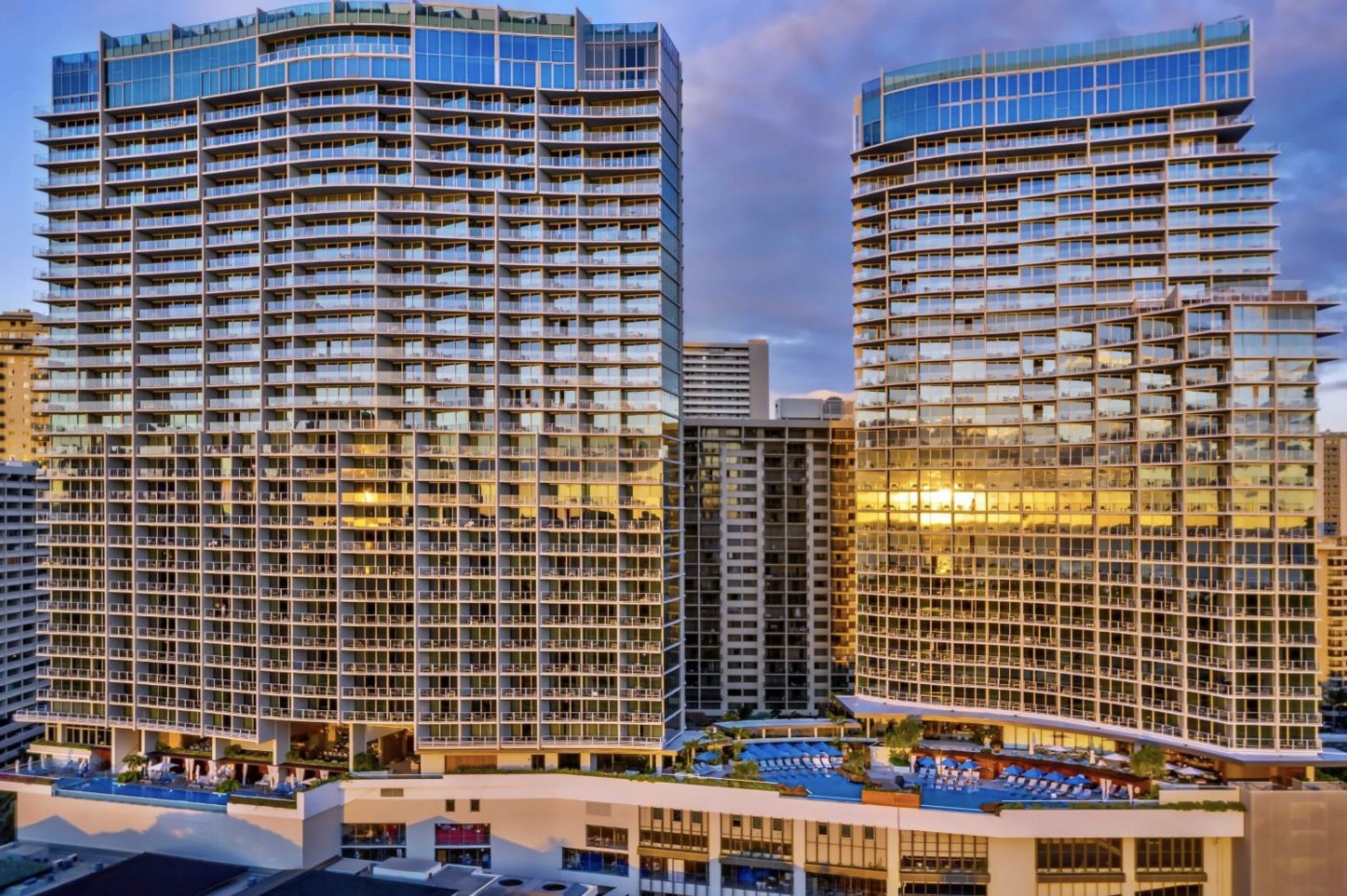
The Ritz-Carlton Residences, Waikīkī Beach is a premier luxury condo-hotel that redefines upscale living in Honolulu. Situated just a short stroll from the iconic Waikīkī Beach, this two-tower development offers a harmonious blend of residential comfort and five-star resort amenities. Each residence, ranging from studios to expansive three-bedroom suites, features floor-to-ceiling windows, private lanais with breathtaking ocean views, fully equipped kitchens with Miele appliances, and in-unit washer/dryers, providing an unparalleled home-away-from-home experience.
As one of the few properties in Waikīkī zoned for legal short-term rentals, the Ritz-Carlton Residences presents a unique investment opportunity. Owners have the flexibility to participate in the hotel’s rental program or select from approved management options, allowing for potential income generation when not in personal use. This model caters to both investors seeking returns and individuals desiring a luxurious vacation home in Hawai‘i.
Residents and guests enjoy access to world-class amenities, including two of Waikīkī’s highest infinity pools with private cabanas, a state-of-the-art fitness center, a full-service spa offering treatments inspired by Hawaiian traditions, and a variety of gourmet dining options such as Sushi Sho. The property also boasts concierge services, valet parking, and proximity to Luxury Row, ensuring a lifestyle of convenience and elegance.
With its prime location, exceptional services, and the prestige of the Ritz-Carlton brand, the Residences offer an extraordinary opportunity for those seeking the finest in Hawai‘i living.
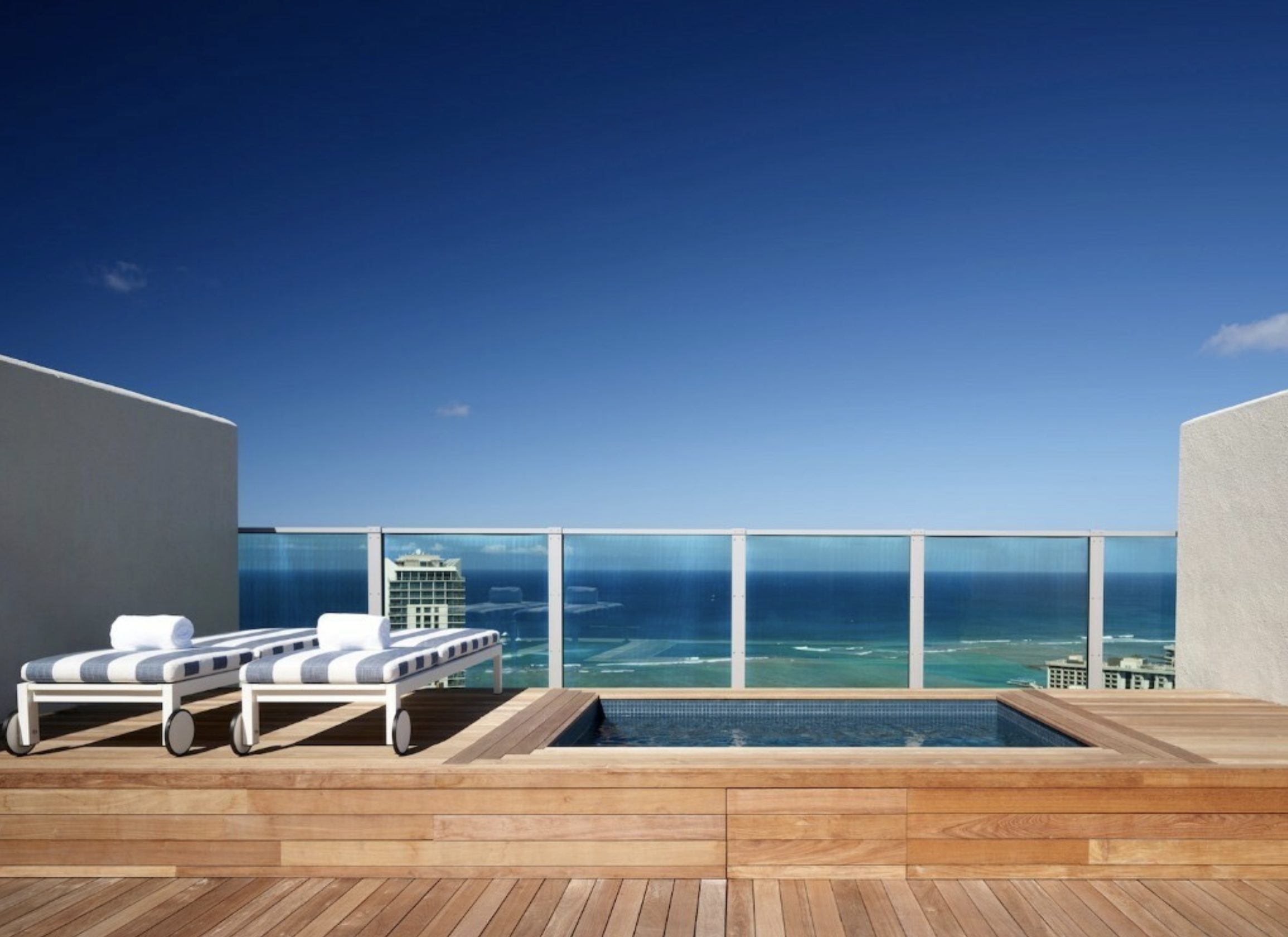
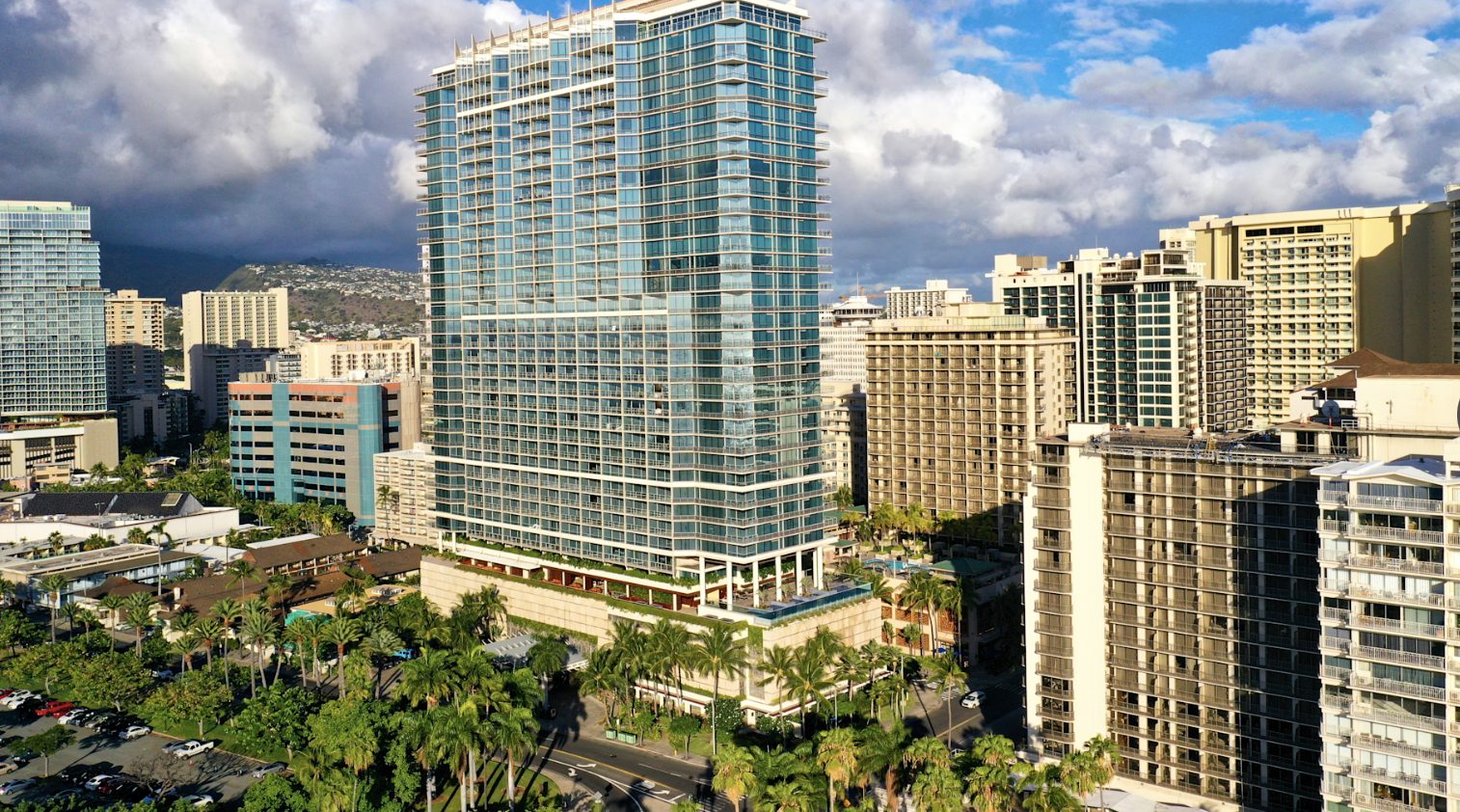
Ka Laʻi Waikīkī Beach is a premier luxury condo-hotel situated in the heart of Waikīkī, Honolulu. Formerly known as the Trump International Hotel Waikīkī, this 38-story property has been rebranded under Hilton’s exclusive LXR Hotels & Resorts collection, marking Hilton’s first LXR property in Hawai‘i . The name “Ka Laʻi,” meaning serenity in Hawaiian, reflects the hotel’s commitment to providing a tranquil and refined experience.
The property offers 462 residential-style accommodations, including studios and one- to three-bedroom suites. Each unit features floor-to-ceiling windows, private lanais with ocean or city views, fully equipped gourmet kitchens with Sub-Zero and Wolf appliances, in-unit washer/dryers, and Italian marble bathrooms with deep soaking tubs . These amenities provide guests with the comforts of home combined with the services of a luxury hotel.
Guests can enjoy a range of upscale amenities, such as a sixth-floor infinity pool with views of the Pacific Ocean, a state-of-the-art fitness center, a full-service spa offering Hawaiian-inspired treatments, and multiple dining options, including the acclaimed Wai‘olu Ocean Cuisine . The hotel’s prime location places it just steps away from Waikīkī Beach, luxury shopping, and vibrant nightlife.
Currently, Ka Laʻi Waikīkī Beach is undergoing a comprehensive $100 million renovation led by the award-winning Bryan O’Sullivan Studio. Scheduled to be completed in phases by March 2026, the renovation aims to enhance guest rooms, public areas, and dining venues, integrating elements of Hawaiian culture and natural materials to create a contemporary yet authentic ambiance .
As a luxury condo-hotel, Ka Laʻi Waikīkī Beach offers a unique opportunity for those seeking both a personal retreat and an investment property in one of Hawai‘i’s most iconic destinations.
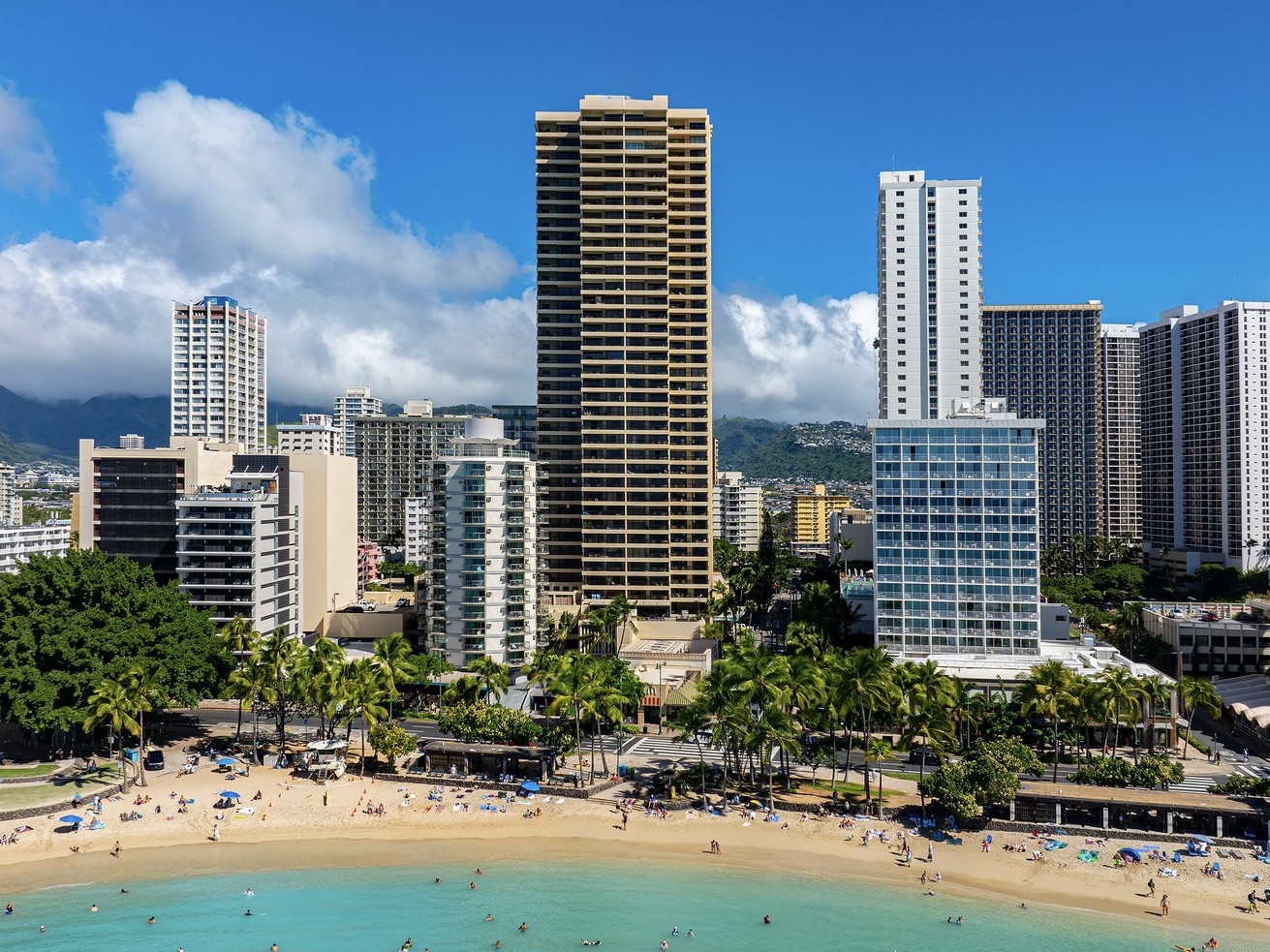
The Aston Waikiki Beach Tower is a luxury condo-hotel located directly across from world-famous Waikīkī Beach. Blending the privacy and spaciousness of condominium living with the services and amenities of a high-end resort, this property offers a unique and highly desirable real estate and hospitality experience. The tower features fully furnished two-bedroom, two-bathroom suites, each with panoramic ocean views, private lanais, modern kitchens, and in-unit washer/dryers—ideal for extended stays or full-time residency.
What sets the Aston Waikiki Beach Tower apart is its condo-hotel model, which allows individual unit ownership while offering optional participation in a professionally managed rental program. This makes it an attractive opportunity for both lifestyle buyers and investors seeking short-term rental income in one of O‘ahu’s most vibrant tourist districts.
Amenities include a newly renovated recreation deck with a heated pool, spa, private cabanas, BBQ grills, fitness center, yoga room, and 24/7 concierge and security services. The property also includes complimentary valet parking, daily housekeeping for guests, and a hospitality suite for early check-ins or late departures.
With its prime location on Kalākaua Avenue, steps from shops, restaurants, and beach activities, the Aston Waikiki Beach Tower offers the best of both worlds: resort-style living with the flexibility and freedom of private ownership.
EXPLORE LUXURY LIVING IN WAIKIKI'S APARTMENT PRECINCT
Waikiki is home to some of Honolulu’s most iconic high-rise residences, including the Waikiki Landmark, Allure Waikiki, and The Watermark. These premier luxury condominiums are located within Waikiki’s exclusive Apartment Precinct Zoning — a designation that allows for more spacious layouts, residential privacy, and resort-style amenities not commonly found in the surrounding Mixed-Use zones.
Whether you’re seeking a full-time residence, vacation home, or long term investment opportunity, these properties offer the perfect blend of modern living, tropical elegance, and unbeatable convenience — just moments from Waikiki Beach, world-class shopping, dining, and entertainment.
From an investment standpoint, the Apartment Precinct offers unique advantages:
-
Stability and Exclusivity: Unlike Resort or Mixed-Use zones, this zoning limits short-term rentals and transient occupancy, resulting in a more stable residential community — a key factor for long-term value appreciation.
-
High-Quality Construction & Amenities: These buildings were designed with discerning residents in mind, featuring high-end finishes, secured entrances, concierge services, fitness centers, pools, and lush landscaped grounds — all of which contribute to enduring desirability and strong resale value.
-
Limited Inventory, Strong Demand: As land availability and new development opportunities in Waikiki are limited, particularly within the Apartment Precinct, existing luxury condo units are positioned to benefit from long-term supply constraints and consistent demand from both local and international buyers.
-
Ideal for Diverse Investment Goals: Whether you’re acquiring a second home, generating passive income through long-term rentals, or planning for future retirement living, these properties offer flexible usage while protecting your investment in one of Hawaii’s most iconic neighborhoods.
The Waikiki Landmark is a distinguished luxury condominium situated at 1888 Kalakaua Avenue, marking the gateway to Waikiki. Completed in 1993, this iconic twin-tower complex features 38 stories and is renowned for its unique architectural design, with five levels of penthouses bridging the two towers at the top .
Offering a variety of residences, the building includes studios, one-, two-, and three-bedroom units, as well as expansive penthouses exceeding 4,000 square feet. Each unit is designed with high-end finishes, such as granite countertops, Italian marble detailing, and floor-to-ceiling tinted glass windows .
Residents enjoy an array of premium amenities, including a large recreation deck on the 15th floor featuring multiple swimming pools connected by waterfalls, a lap pool, children’s pool, whirlpool spa, and a fitness center. Additional facilities include a sauna, BBQ area, party room, and a beautifully landscaped courtyard with a waterfall and koi pond . The building also offers 24-hour security, concierge services, and a multi-level parking garage for residents’ convenience .
Strategically located within Waikiki’s Apartment Precinct Zoning, the Waikiki Landmark provides residents with a tranquil living environment while being in close proximity to world-class shopping, dining, and entertainment options. Its prime location offers easy access to Ala Moana Shopping Center, Ala Moana Beach Park, and the vibrant attractions of Waikiki .
With its blend of architectural elegance, luxurious amenities, and prime location, the Waikiki Landmark stands as a premier choice for those seeking an upscale lifestyle in Honolulu’s most vibrant neighborhood.
The Allure Waikiki is a premier luxury condominium situated at 1837 Kalakaua Avenue, marking the entrance to Waikiki. Completed in 2010, this 35-story tower encompasses 300 residences, offering a blend of modern design and island-inspired elegance. Its prime location provides residents with easy access to Waikiki Beach, Ala Moana Center, and the Hawaii Convention Center, all within walking distance.
Residents of Allure Waikiki enjoy an array of upscale amenities, including a 6th-floor recreation deck featuring an infinity-edge pool, hot tub, and BBQ areas set amidst lush tropical landscaping. The building also boasts a state-of-the-art fitness center, clubroom with a fully appointed kitchen, and a library. Security is a priority, with 24-hour secured entry, fob-access elevators, and on-site management. Additionally, the property offers surfboard and bicycle storage, guest parking, and is pet-friendly, accommodating one dog or cat up to 25 lbs.
Each residence is thoughtfully designed with high-end finishes, including gourmet kitchens equipped with Viking appliances, granite countertops, and hardwood cabinetry. Units feature central air conditioning, private lanais, and spa-inspired bathrooms with glass-door showers and designer fixtures. Floor plans range from one to three bedrooms, catering to a variety of lifestyle needs.
Strategically located within Waikiki’s Apartment Precinct Zoning, Allure Waikiki offers a tranquil residential environment while being in close proximity to the vibrant attractions of Waikiki. Its combination of luxurious amenities, prime location, and elegant design makes it a standout choice for those seeking upscale living in Honolulu.
The Watermark Waikiki, located at 1551 Ala Wai Boulevard, is a distinguished luxury condominium that seamlessly blends resort-style living with the convenience of urban life. Completed in 2008, this 38-story tower houses 212 residences, offering two- and three-bedroom floor plans ranging from approximately 1,081 to 2,199 square feet. Each unit features high-end finishes such as African mahogany cabinetry, Brazilian granite countertops, Viking appliances, and floor-to-ceiling windows that provide panoramic views of the ocean, marina, and cityscape.
Nestled within a serene, four-acre gated community, The Watermark boasts lush tropical gardens, walking paths, and a variety of resort-style amenities. Residents can enjoy a heated lagoon-style infinity pool, hot tub, state-of-the-art fitness center, separate men’s and women’s saunas, and multiple BBQ pavilions. Additional conveniences include a media room/library, 24-hour security, concierge services, and storage facilities for bicycles, kayaks, and surfboards.
Strategically situated at the western edge of Waikiki, The Watermark offers a tranquil living environment while being within walking distance to Ala Moana Center, Ala Moana Beach Park, and the vibrant attractions of Waikiki. Its location within the Apartment Precinct Zoning ensures a residential atmosphere, distinct from the busier resort zones.
With its combination of luxurious residences, exceptional amenities, and prime location, The Watermark Waikiki stands as a premier choice for those seeking upscale living in Honolulu.
LOCAL LIFESTYLE
The local lifestyle in Waikīkī is a vibrant fusion of island leisure, urban convenience, and cultural richness, offering residents and visitors a unique rhythm of life unlike anywhere else in Hawaiʻi. With its iconic stretch of white sand beaches, warm ocean waters, and year-round sunshine, outdoor living is at the heart of daily life. Surfing at Queen’s, morning walks along the Ala Wai Canal, beach yoga, and sunset gatherings at Kapiʻolani Park are all part of the everyday experience. Despite its reputation as a tourist hub, Waikīkī also supports a close-knit residential community, especially in quieter areas just off the main strip. Locals enjoy easy access to world-class dining, boutique shopping, live music, and art events, all within walking distance. The area blends luxury and laid-back charm—residents can move from a beach paddle session to a rooftop cocktail in the same day. With its walkable design, excellent public transportation, and proximity to top schools and medical centers, Waikīkī appeals to a broad demographic including professionals, retirees, and remote workers seeking an active yet relaxed island lifestyle. Community events, farmers’ markets, and cultural festivals keep the spirit of aloha alive, making Waikīkī not just a destination, but a place to truly call home.
DEMOGRAPHIC DATA FOR WAIKĪKĪ
Waikīkī, a globally recognized beachfront neighborhood in Honolulu, is a highly sought-after real estate market due to its prime location, lifestyle appeal, and consistent demand from both local and international buyers. With a resident population of approximately 28,000, Waikīkī’s demographics are uniquely shaped by a mix of full-time residents, second-home owners, and a steady stream of short-term visitors. The area is culturally diverse, with strong representation from Asian (particularly Japanese and Filipino), White, and Native Hawaiian/Pacific Islander communities. The median age tends to be higher, reflecting a sizable number of retirees and affluent buyers seeking vacation properties or investment opportunities. The housing landscape is dominated by high-rise condominiums, many offering ocean views and resort-style amenities, with a mix of fee simple and leasehold ownership. Waikīkī remains one of Honolulu’s most dynamic and competitive real estate markets, driven by its appeal to international investors, high rental potential, and proximity to beaches, dining, shopping, and entertainment.
ALL DATA FROM UNITED STATES CENSUS BUREAU 2023 - DATA FOR WAIKIKI AREAS, ZIP CODE 96815
TOTAL POPULATION
0
TOTAL HOUSEHOLDS
0
TOTAL HOUSING UNITS
0
MEDIAN HOUSEHOLD INCOME
$0
EMPLOYMENT RATE
0%
POPULATION BY AGE GROUP
OCCUPATION (Population 16 years and older)
CLASS OF WORKERS
EDUCATION ATTAINMENT (Population 25 years and older)
ALL DATA FROM UNITED STATES CENSUS BUREAU 2023 - DATA FOR WAIKIKI AREA, ZIP CODE 96815
FROM A REAL ESTATE PERSPECTIVE
As of early 2025, the Ala Moana real estate market is experiencing a nuanced shift, offering both challenges and opportunities for buyers and sellers. The median home sale price stands at $860,000, reflecting a slight 0.9% decrease year-over-year. Notably, one-bedroom units saw an 8.8% decline to $625,000, while two-bedroom units appreciated by 4.8% to $975,000 . Inventory levels have risen across all categories, with a notable 9.8% increase in two-bedroom listings from January to February 2025. This uptick in supply has led to a more balanced market, where 84% of homes are selling below asking price and the average days on market have extended to 101 days, a 73% increase from the previous year . These trends indicate a shift towards a buyer-friendly environment, providing greater negotiation leverage and a wider selection of properties. For sellers, strategic pricing and enhanced property presentation are becoming increasingly crucial to attract discerning buyers in this evolving market landscape.
OWNER / RENTER CHARACTERISTICS
BEDROOMS IN OCCUPIED HOUSING UNITS

